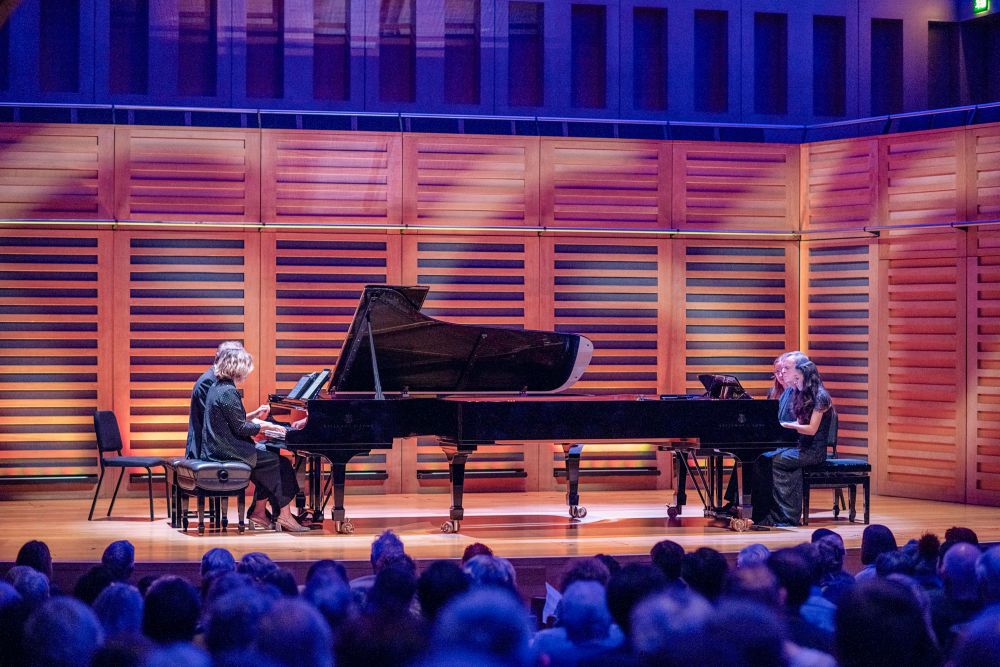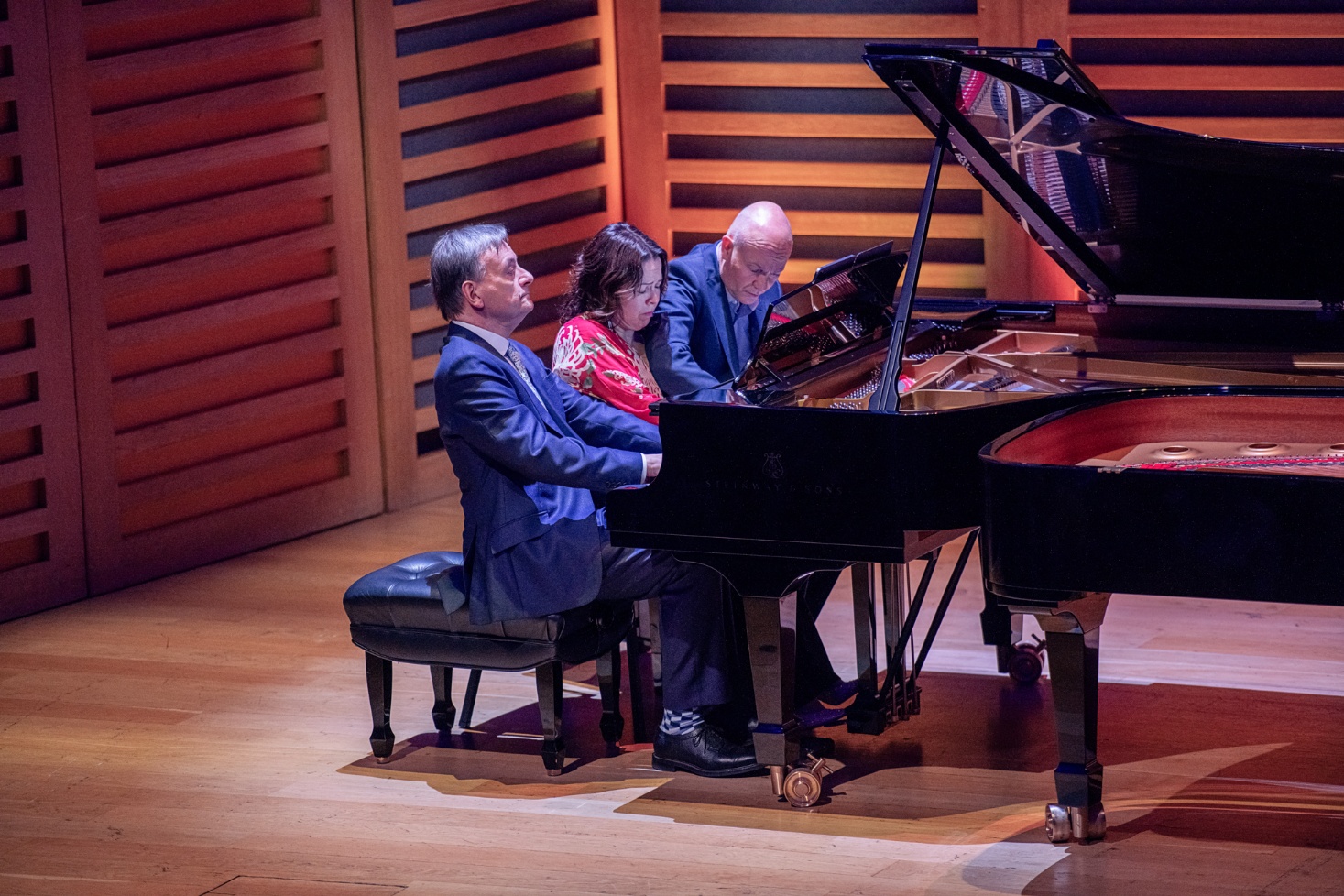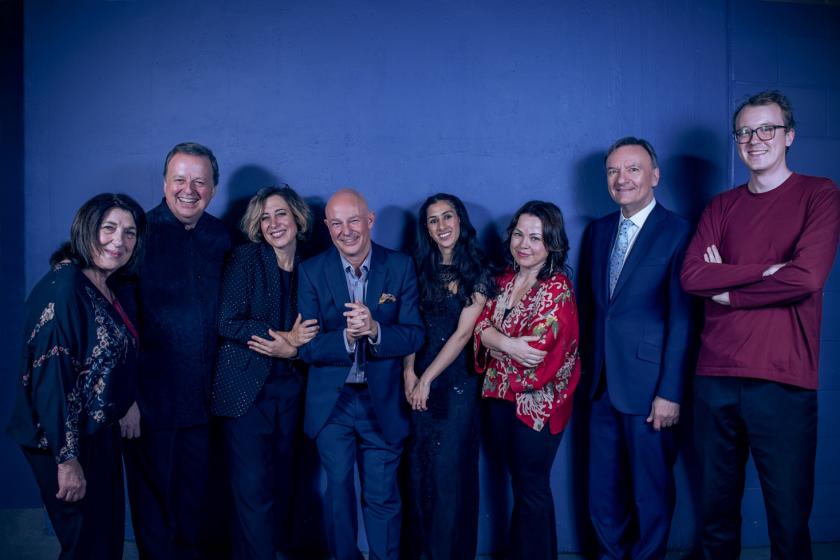Never mind the permutations (anything up to eight hands on the two pianos); feel the unwavering quality of the eight pianists and the 13 works, each perfect in their proper place across two and a half hours of more or less continuous music. Above all, applaud the artistic directors of the London Piano Festival, Katya Apekisheva and Charles Owen, for choosing so unerringly how and with whom to celebrate this spectacular 10th anniversary.
Given the even distribution of superb pianism and compelling repertoire, it will merely be a matter of personal preference what came out tops for various members of the audience. Biggest revelations for me were Britten’s Mazurka Elegiaca and Smetana’s E minor Sonata movement for two pianos and eight hands. The Britten because of its peculiar, moonwalking atmosphere as conjured by Stephen Hough, who’d been giving what sounded like a fascinating afternoon “Piano Clinic”, masterclasses with a difference, and Ronan O’Hora, Britten’s “Tyger” as a youth, now Head of Keyboard Studies and Head of Advanced Performance Studies at the Guildhall School of Music and Drama. The Smetana because, though a relatively early work, it teems with vital ideas beautifully interwoven in the hands of O’Hora, Ingrid Fliter, Joseph Havlat and Mishka Rushdie-Momen (pictured below).  Havlat’s polytonal-comic 64 Geese - "the title...bears no relation to the music and was arbitrarily chosen" - just worked at the beginning of the programme. Sitting opposite Owen and Apekisheva, Havlat looked remarkably well for someone who died in 1827, as the programme note joke would have it (oh, hang on, born in 1770? Is this Beethoven reincarnated?). That was a UK premiere; the festival commissions were Hough’s Walton-pastichey King’s Cross March, the jeu d’esprit at the beginning of the second half, and Elena Langer’s RedMare, with dizzying work from Rushdie-Momen and Havlat. Without reading her explanatory essay first, I hazarded a guess that it was “about” the energy of the Russian Revolution, or at least the years leading up to it. The source turned out to be Petrov-Vodkin’s Fantasy depicting a red horse charging forward while the rider looks backward. “Expect a lot of fast notes, chastushki-like tunes and horsey rhythms,” wrote Langer, and we got them.
Havlat’s polytonal-comic 64 Geese - "the title...bears no relation to the music and was arbitrarily chosen" - just worked at the beginning of the programme. Sitting opposite Owen and Apekisheva, Havlat looked remarkably well for someone who died in 1827, as the programme note joke would have it (oh, hang on, born in 1770? Is this Beethoven reincarnated?). That was a UK premiere; the festival commissions were Hough’s Walton-pastichey King’s Cross March, the jeu d’esprit at the beginning of the second half, and Elena Langer’s RedMare, with dizzying work from Rushdie-Momen and Havlat. Without reading her explanatory essay first, I hazarded a guess that it was “about” the energy of the Russian Revolution, or at least the years leading up to it. The source turned out to be Petrov-Vodkin’s Fantasy depicting a red horse charging forward while the rider looks backward. “Expect a lot of fast notes, chastushki-like tunes and horsey rhythms,” wrote Langer, and we got them.
The second-half symbol of postwar upheaval was Ravel’s La Valse, always moving forward to destruction in the hands of Havlat and O’Hora. Correspondences in terms of the longest works were between Mozart’s Sonata in D, K448, Apekisheva and Fliter relishing the extended codas of the Andante and Finale, and Brahms’s Haydn Variations (Rushdie-Momen and O’Hora), so much more satisfying, for me at any rate, in the composer’s original two-piano version than in the orchestral standard, which never seems to fit well in a concert programme.  The Britten was followed by Poulenc’s bittersweet Élégie, with figurative glass of cognac and cigar as the composer put it, but spiced with strangeness and belated discords (Owen and Apekisheva). Seta Tanyel brought esprit to Shostakovich’s rather too facile Concertino – it was composed for the 15-year-old Maxim, after all – with Owen, and a no-holds barred celebration of garish folk colour in Arno Babajanian’s Armenian Rhapsody (now 75, Tanyel was born in Istanbul of Armenian parentage).
The Britten was followed by Poulenc’s bittersweet Élégie, with figurative glass of cognac and cigar as the composer put it, but spiced with strangeness and belated discords (Owen and Apekisheva). Seta Tanyel brought esprit to Shostakovich’s rather too facile Concertino – it was composed for the 15-year-old Maxim, after all – with Owen, and a no-holds barred celebration of garish folk colour in Arno Babajanian’s Armenian Rhapsody (now 75, Tanyel was born in Istanbul of Armenian parentage).
There would, of course, be no encores, but serving as such were the delicious lilts Fliter and Owen brought, clearly delighting in each other’s contributions, to Albeniz’s “Triana” from Iberia and the perfect poise of Hough, Apekisheva and Owen brought to the 17-year old Rachmaninov’s Romance, ending as the concert began with six hands but this time at one piano (pictured above). An irresistibly life-affirming achievement from first to last.














Add comment